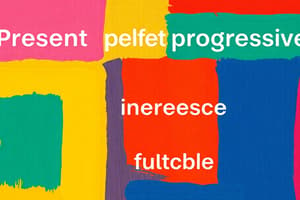Podcast
Questions and Answers
Which sentence correctly uses 'going to' to express a future prediction based on present evidence?
Which sentence correctly uses 'going to' to express a future prediction based on present evidence?
- The sky is clear; it is going to be a warm day. (correct)
- She is going to study medicine next year.
- They are going to move to a new city because of their job.
- I am going to travel to Europe next summer, it should be fun.
Which of the following sentences uses the present continuous to indicate a future arrangement?
Which of the following sentences uses the present continuous to indicate a future arrangement?
- I am liking this new restaurant a lot.
- I am considerIng a new job offer.
- I am knowing the answer to this question.
- I am flying to Paris next week for a conference. (correct)
Which sentence uses the present simple to refer to a future event that is part of a schedule or timetable?
Which sentence uses the present simple to refer to a future event that is part of a schedule or timetable?
- I think she arrives late every day.
- The movie starts at 7 PM this Friday. (correct)
- She arrives whenever she wants.
- He is usually arriving on time.
Which of the following sentences appropriately uses the future continuous?
Which of the following sentences appropriately uses the future continuous?
Which sentence demonstrates the correct use of the future perfect tense?
Which sentence demonstrates the correct use of the future perfect tense?
Which of the following sentences uses 'be about to' to indicate an imminent event?
Which of the following sentences uses 'be about to' to indicate an imminent event?
Which of the following sentences expresses a spontaneous decision using 'will'?
Which of the following sentences expresses a spontaneous decision using 'will'?
Which sentence correctly uses "intend to" to express a future intention?
Which sentence correctly uses "intend to" to express a future intention?
Flashcards
"Going to"
"Going to"
Future plans and predictions using 'be' + 'going to' + base verb.
"Will"
"Will"
Future predictions and spontaneous decisions using 'will' + base verb.
Present Continuous (future)
Present Continuous (future)
Definite future arrangements at a specific time or place using 'am/is/are' + '-ing' verb.
Present Simple (future)
Present Simple (future)
Signup and view all the flashcards
Future Continuous
Future Continuous
Signup and view all the flashcards
Future Perfect
Future Perfect
Signup and view all the flashcards
"Be about to"
"Be about to"
Signup and view all the flashcards
"Would like to"
"Would like to"
Signup and view all the flashcards
Study Notes
- Expressing future plans and intentions in English involves various grammatical structures
- These structures allow speakers to communicate what they intend to do, or predict what will happen
"Going to"
- Used to express future plans and intentions
- Also used to make predictions based on present evidence
- Formed using "be" (am, is, are) + "going to" + base form of the verb
- Example: "I am going to travel to Italy next month" (plan)
- Example: "Look at those dark clouds. It is going to rain" (prediction)
"Will"
- Used for future predictions
- Can also be used to express spontaneous decisions or intentions
- Formed using "will" + base form of the verb
- Example: "I think it will snow tomorrow" (prediction)
- Example: "I will answer the phone" (spontaneous decision)
Present Continuous
- Used to talk about future arrangements
- Usually involves a specific time or place
- Formed using "be" (am, is, are) + present participle (-ing) of the verb
- Example: "I am meeting John at 6 PM tonight"
Present Simple
- Used to refer to future events that are scheduled or part of a timetable
- Common with transport timetables, movie schedules, etc.
- Uses the base form of the verb (or -s/-es for third person singular)
- Example: "The train leaves at 9 AM tomorrow"
Future Continuous
- Used to describe an action that will be in progress at a specific time in the future
- Formed using "will be" + present participle (-ing) of the verb
- Example: "At 8 PM tonight, I will be eating dinner"
Future Perfect
- Used to describe an action that will be completed by a specific time in the future
- Formed using "will have" + past participle of the verb
- Example: "By next year, I will have finished my studies"
Other expressions
- "Be about to": Indicates something will happen imminently; example: "The movie is about to start."
- "Be planning to": Expresses a plan; example: "I am planning to visit my family soon."
- "Intend to": Expresses an intention; example: "I intend to learn Spanish."
- "Would like to": Expresses a wish or desire; example: "I would like to travel the world."
Studying That Suits You
Use AI to generate personalized quizzes and flashcards to suit your learning preferences.




